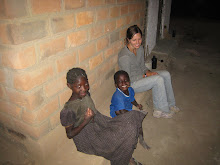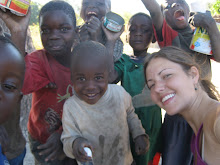Thank goodness for technology. Having finally caved in to the IPhone that my dad generously handed down to me after he upgraded a few months ago, I have been able to reap some of the benefits of its intelligence. For one, I realized yesterday morning that I could simply go onto my phone’s clock, search for Lusaka, and voila!, I knew that on March 12 at 9:00 in the morning it would be 5:00 in the evening in my old home of Fiwila, Mkushi Province, Zambia, Africa.
It was important for me to know this because at 17:00 hours (how they would be referring to 5:00 PM in Fiwila), I had a phone date scheduled with my dear Zambian sister and friend, Paxina. Once again I must thank technology for giving me the ability to organize this call, let alone place it. In the past I had settled for the bright pink air mail envelopes and colorful international stamps as the only means of maintaining contact with my cherished village of Fiwila. Now, thanks to Gmail, smart phones, Skype and, most importantly, the cell phone tower recently constructed near Fiwila, I have the ability to hear the voices and nature sounds of my beloved African village as I stare out my apartment window at a parking lot full of cars in the mile high city of Denver, CO, USA.
So, last Sunday morning, most likely around 8:15 am or so, after figuring out I had forty-five minutes to pass before placing what I regarded as an extremely important phone call, I patiently made myself a breakfast of porridge (a meal I ate frequently in my Peace Corps days) and shuffled back and forth in my barefoot feet on the kitchen floor. I stared at my refrigerator, where I had lovingly pegged a photograph Paxina had sent me of herself in her school uniform, most likely taken long before I had even met her. The photograph overlapped a stark white page of copy paper with the following characters etched out in wobbly black pen for the first line, lead
pencil in the second line repeating itself:
12345678910
12345678910
ABCD
ABCD
PRISCOVIA
PRISCOVIA
I stared at my refrigerator and imagined myself on the phone with Paxina, me telling my friend that I had hung these items up on my refrigerator. I came back to reality and decided against doing so. Surely she knew what a refrigerator was but would she understand that I had my own? Even if she did, surely she would not understand the pride that is involved with choosing which photographs and child artwork to decorate it with.
My stomach did a few somersaults. I nostalgically thought about the fact that nearly two years had passed since I had last heard Paxina’s voice. I selfishly and enviously wondered whether the Peace Corps Volunteer Natalie that currently lives in Fiwila has become Paxina’s favorite American friend. I invested hope that the most simple and innocent friendship of my life still had somewhat of an equally important value to my friend.
I passed the next thirty minutes talking to my computer screen in frustration as I impatiently tried to navigate the Skype website. At one point I interrupted my stress with a deep breath, calmly reminding myself that Zamtime did in fact exist in the place where I was calling and Paxina would most likely still answer even if I was fifteen minutes late to our date together. It would in fact be much too American of me to call precisely at 17:00 hours.
Finally, the clock and my credit card information on Skype were both synchronized with one another and it was time for the call. After dialing, a familiar and joyous Zampop song performed for me through the speakers in my computer. The seconds that I waited seemed to be minutes until a familiar voice picked up.
“Halo?” Paxina shouted over the Atlantic ocean to me.
The tone of my voice seemed to suddenly increase its pitch by two octaves as I questioned, “Paxina? Hello! Can you hear me?” The corners of my lips turned up to my ears.
“Halo, Ba Rachel…?”
I heard gusts of wind as we repeated this dialogue back and forth a few times over before I decided to give a gamble to using the Skype app on my IPhone rather than my desktop computer. I worried that the connection was poor on the Zambian side. Thank goodness when I called back the connection was clearer.
“I am very happy to speak with you Ba Rachel,” Paxina proceeded to tell me, her intonation rising in a sing song voice as she enunciated the word “very” and decrescendoed back down to finish out the sentence.
My smile stretched at hearing Paxina’s thick Zambian English accent and I naturally modeled this in my own speech back. There were occasional awkward breaks in dialogue as both of us had to ask for the other to repeat what we had just asked. In all other aspects, however, I might as well have been sitting on a stool under the thatch roof of her insaka, gazing at the open air fire as she prepared nshima for our
dinner in the twilight. At one point in our conversation I affectionately asked if she was getting ready to prepare nshima.
“Yes!” She said in somewhat of a surprised voice. “So you don’t
eat nshima in America?” she asked me laughing.
I told her in the simplest English I could muster about searching in Mexican markets for maize meal and eating the occasional nshima dinner with other friends who understood Africa. She seemed genuinely surprised when I informed her it was morning in the place from which I was talking to her.
“Shoo—ah”? She giggled.
My proudest moment of the chat was when she enthusiastically reported to me about passing grade twelve and applying to nursing school. She had just returned from interviews for the program she hoped to be accepted to and had another trip planned at the end of the month for a second interview at a different school. She nervously exclaimed that in one of the programs there had been hundreds of applicants for a mere twelve spots. I tried my best to soak up all the details about the interview process and when she would know if she had been accepted into any of the programs, noting to myself that I would be doing my best to fund raise for a scholarship back in the States in order for her to finish school.
I asked about various family members of my host family as I listened to sounds of laughter of children playing in the background. I learned that Paxina’s daughter Priscovia was in the first grade and that Bambuya, my host mother, was sleeping in another shelter due to her house having been destroyed by the wind. My body breathed a sigh of relief as I inquired about the well being of my host brother Godwin’s widow, Bana Go, and her five children (Godwin’s death during my Peace Corps service affects me greatly to this day). The smile in Paxina’s voice sparkled as she told me they were all doing well.
I tried my best to dig some Bemba language out from the back of my brain and clumsily mustered a “Ndemifuluka” from my lips.
“Oh you miss us? We miss you too Ba Rachel.”
“Si” I said back, quickly substituting the Spanish that automatically came out of my mouth to an “Ehhhh. Ndemifuluka sana sana,” emphasizing the sincere and genuine truth that I missed her, her family, and community members very very much.
It was not too long after that in which an automated Skype message rudely cut off our conversation, telling me I did not have enough balance left to complete the call. I considered adding more money to be able to call back and tell Paxina my proper goodbyes. In the end, I decided my sore and tender heart did not have enough endurance left to say a goodbye yet again.
I nursed the nostalgia and African homesickness throughout the rest of the day. I practiced the piano and felt strange imagining what my Zambian family would think if they could see me in that moment. I dusted the African chitenge fabrics out of my closet and admired the beautiful prints of the fabrics. I used my finger to trace the designs etched into the wooden spoons that sit perched on my stove. Paxina had given me those spoons as a goodbye gift, or rather what Zambians refer to as a rememberance gift. I once again stared at the photo hung on my refrigerator. I smiled and felt grateful.








 insert
insert






